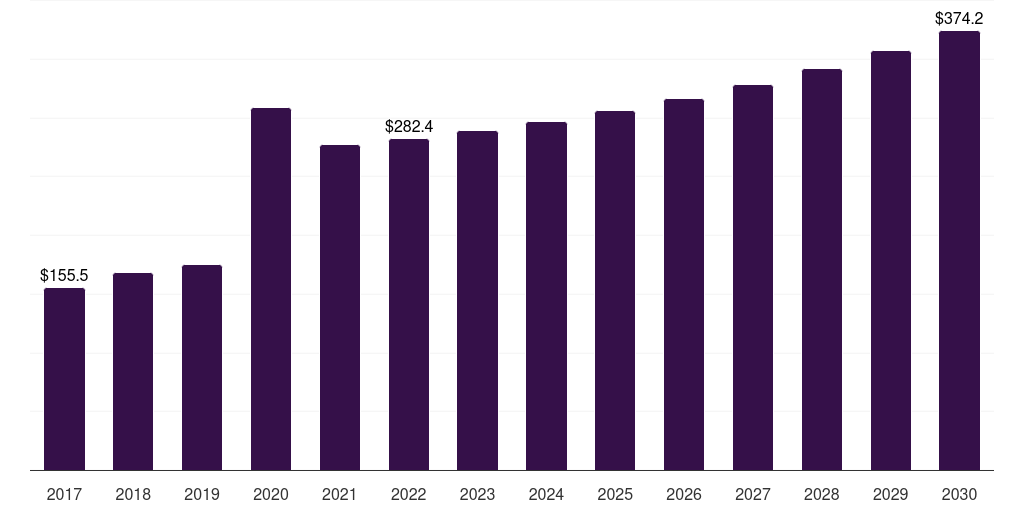South Africa Wet Wipes Market Size & Outlook, 2022-2030
South Africa wet wipes market, 2017-2030 (US$M)

Related Markets
South Africa wet wipes market highlights
- The South Africa wet wipes market generated a revenue of USD 282.3 million in 2022 and is expected to reach USD 374.2 million by 2030.
- The South Africa market is expected to grow at a CAGR of 3.6% from 2023 to 2030.
- In terms of segment, household/disinfectant/cleaning wipes was the largest revenue generating type in 2022.
- Intimate Wipes is the most lucrative type segment registering the fastest growth during the forecast period.
Wet wipes market data book summary
| Market revenue in 2022 | USD 282.3 million |
| Market revenue in 2030 | USD 374.2 million |
| Growth rate | 3.6% (CAGR from 2022 to 2030) |
| Largest segment | Household/disinfectant/cleaning wipes |
| Fastest growing segment | Intimate Wipes |
| Historical data | 2017 - 2021 |
| Base year | 2022 |
| Forecast period | 2023 - 2030 |
| Quantitative units | Revenue in USD million |
| Market segmentation | Baby Wipes, Facial & Cosmetic Wipes, Hand & Body Wipes, Intimate Wipes, Flushable Wet Wipe, Household/Disinfectant/Cleaning Wipes |
| Key market players worldwide | Clorox Co, Kimberly-Clark Corp, Reckitt Benckiser Group PLC, Unilever PLC, Johnson & Johnson, The Honest Co Inc, Procter & Gamble Co, Himalaya Wellness, Wipesplus |
Other key industry trends
- In terms of revenue, South Africa accounted for 1.0% of the global wet wipes market in 2022.
- Country-wise, U.S. is expected to lead the global market in terms of revenue in 2030.
- In Middle East & Africa, South Africa wet wipes market is projected to lead the regional market in terms of revenue in 2030.
- South Africa is the fastest growing regional market in Middle East & Africa and is projected to reach USD 374.2 million by 2030.
No credit card required*
Horizon in a snapshot
- 30K+ Global Market Reports
- 120K+ Country Reports
- 1.2M+ Market Statistics
- 200K+ Company Profiles
- Industry insights and more
Wet Wipes Market Scope
Wet Wipes Market Companies
| Name | Profile | # Employees | HQ | Website |
|---|
South Africa wet wipes market outlook
The databook is designed to serve as a comprehensive guide to navigating this sector. The databook focuses on market statistics denoted in the form of revenue and y-o-y growth and CAGR across the globe and regions. A detailed competitive and opportunity analyses related to wet wipes market will help companies and investors design strategic landscapes.
Household/disinfectant/cleaning wipes was the largest segment with a revenue share of 32.34% in 2022. Horizon Databook has segmented the South Africa wet wipes market based on baby wipes, facial & cosmetic wipes, hand & body wipes, intimate wipes, flushable wet wipe, household/disinfectant/cleaning wipes covering the revenue growth of each sub-segment from 2017 to 2030.
Improving hygiene awareness among people in the country is driving the growth of the South African wet wipes market. The key player in the market introduced various types of wipes such as hand & body wipes, facial & cosmetic wipes, baby wipes, and intimate to cater to the increased consumer demand.
Baby wipes are gaining traction owing to factors such as rising infant population in the country and increasing awareness regarding good hygiene practices. Baby wipes are not exclusively used on babies, but also children and adults, a practice that has been driving product demand.
The demand for nonwoven wipes has increased due to various factors including changing lifestyles, the growing need to adapt to a sustainable solution, the rise in consumer disposable income, and product innovation. Additionally, due to the increased health and hygiene concerns in the post-pandemic world, their use has been promoted in the food service and healthcare sectors.
Reasons to subscribe to South Africa wet wipes market databook:
-
Access to comprehensive data: Horizon Databook provides over 1 million market statistics and 20,000+ reports, offering extensive coverage across various industries and regions.
-
Informed decision making: Subscribers gain insights into market trends, customer preferences, and competitor strategies, empowering informed business decisions.
-
Cost-Effective solution: It's recognized as the world's most cost-effective market research database, offering high ROI through its vast repository of data and reports.
-
Customizable reports: Tailored reports and analytics allow companies to drill down into specific markets, demographics, or product segments, adapting to unique business needs.
-
Strategic advantage: By staying updated with the latest market intelligence, companies can stay ahead of competitors, anticipate industry shifts, and capitalize on emerging opportunities.
Target buyers of South Africa wet wipes market databook
-
Our clientele includes a mix of wet wipes market companies, investment firms, advisory firms & academic institutions.
-
30% of our revenue is generated working with investment firms and helping them identify viable opportunity areas.
-
Approximately 65% of our revenue is generated working with competitive intelligence & market intelligence teams of market participants (manufacturers, service providers, etc.).
-
The rest of the revenue is generated working with academic and research not-for-profit institutes. We do our bit of pro-bono by working with these institutions at subsidized rates.
Horizon Databook provides a detailed overview of country-level data and insights on the South Africa wet wipes market , including forecasts for subscribers. This country databook contains high-level insights into South Africa wet wipes market from 2017 to 2030, including revenue numbers, major trends, and company profiles.
Partial client list
South Africa wet wipes market size, by type, 2017-2030 (US$M)
South Africa Wet Wipes Market Outlook Share, 2022 & 2030 (US$M)
Related regional statistics
Sign up - it's easy, and free!
Sign up and get instant basic access to databook, upgrade
when ready, or enjoy our
free plan indefinitely.
Included in Horizon account
- 30K+ Global Market Reports
- 120K+ Country Reports
- 1.2M+ Market Statistics
- 200K+ Company Profiles
- Industry insights and more



